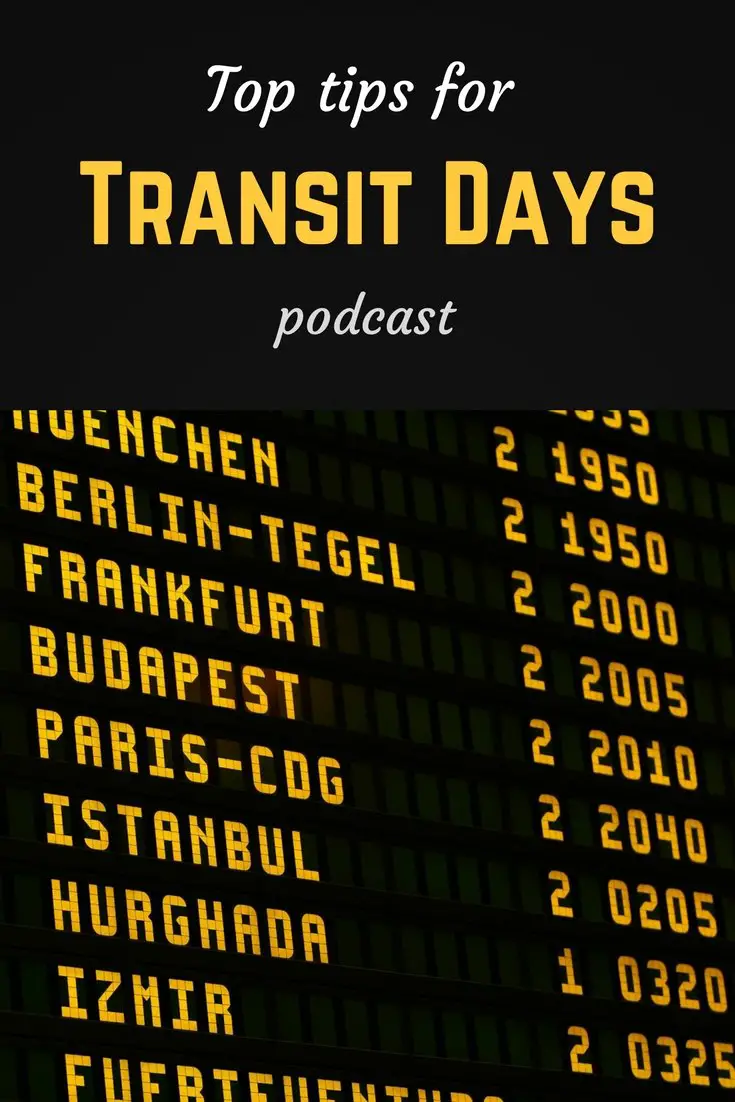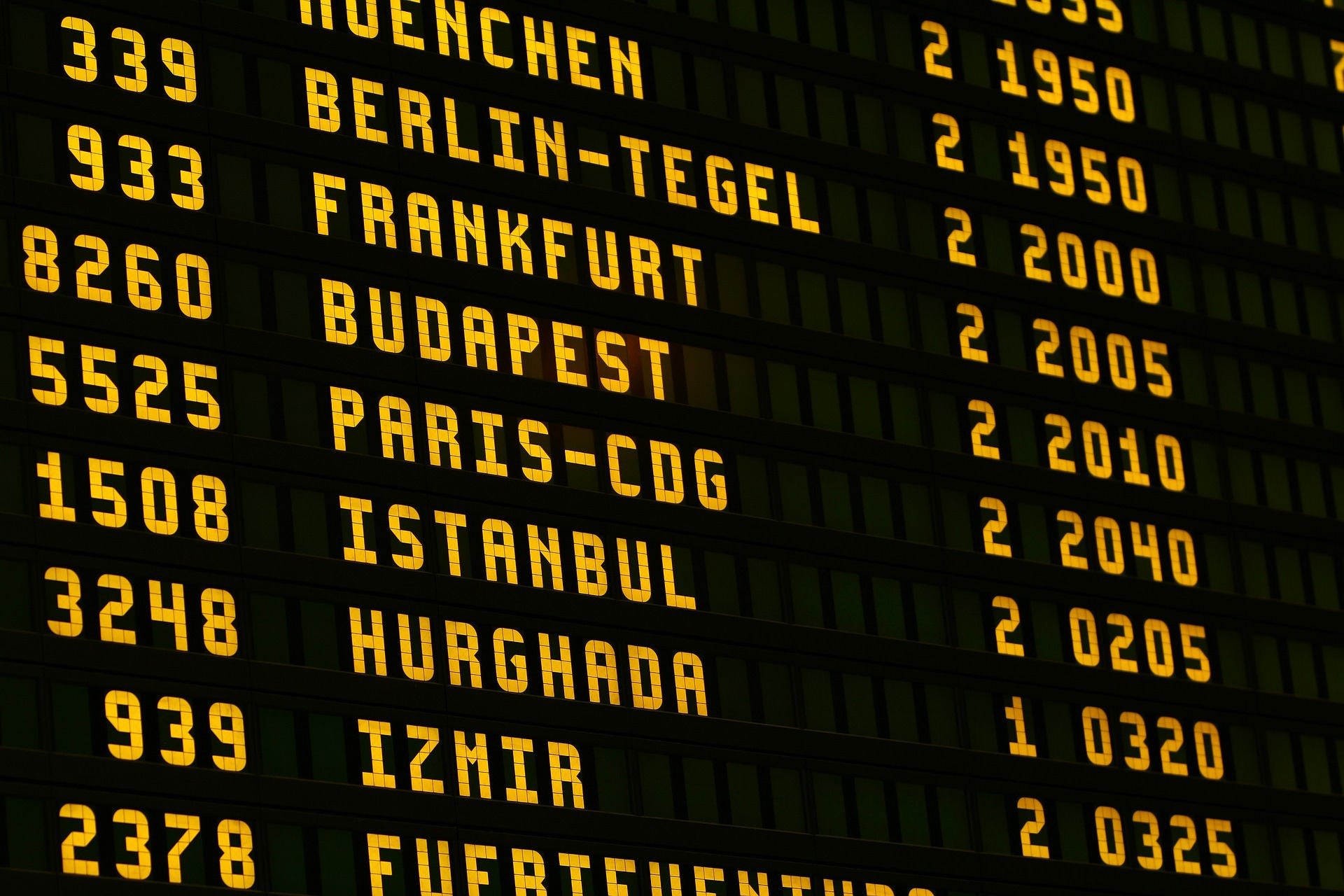Top tips for transit days podcast
Travel days are often the most stressful part of a trip. You may be tired or jetlagged for all or part of the journey, and you’re having to make decisions and deal with unfamiliar situations with that fuzzy head! Not to mention that things can and do go wrong when you’re moving from place to place, and finding a solution can be more difficult when you don’t have access to your usual tools and support.
However, travel days can be fantastic too — a fun part of a larger trip. We’ve had hundreds of transit days, some of which went better than others, and have picked up a bunch of tips for staying sane in transit.
To listen, hit play below or find episode 354 in iTunes, Stitcher or Soundcloud:
1. Do your pre-trip checks the night before
Being prepared is a big part of having a successful transit day. Spend five minutes checking that you have your passport and that it hasn’t expired, and make sure you have a valid visa for your destination, or that you’re exempt from needing one. If I’d done that before our trip to Ukraine, I wouldn’t have been unceremoniously asked to leave the train and turned back into Moldova!
Also check the dates and times of your flight (or other transport information) and check the airline’s quirks. Do you have to check in online? Is a meal included in your fare? How many bags can you check, and what are the limits for carry-on luggage? It seems that every airline is different, and many use excess baggage as a major form of income; checking this information will help avoid unpleasant surprises at the airport.
Check out our pre-trip checklist podcast.
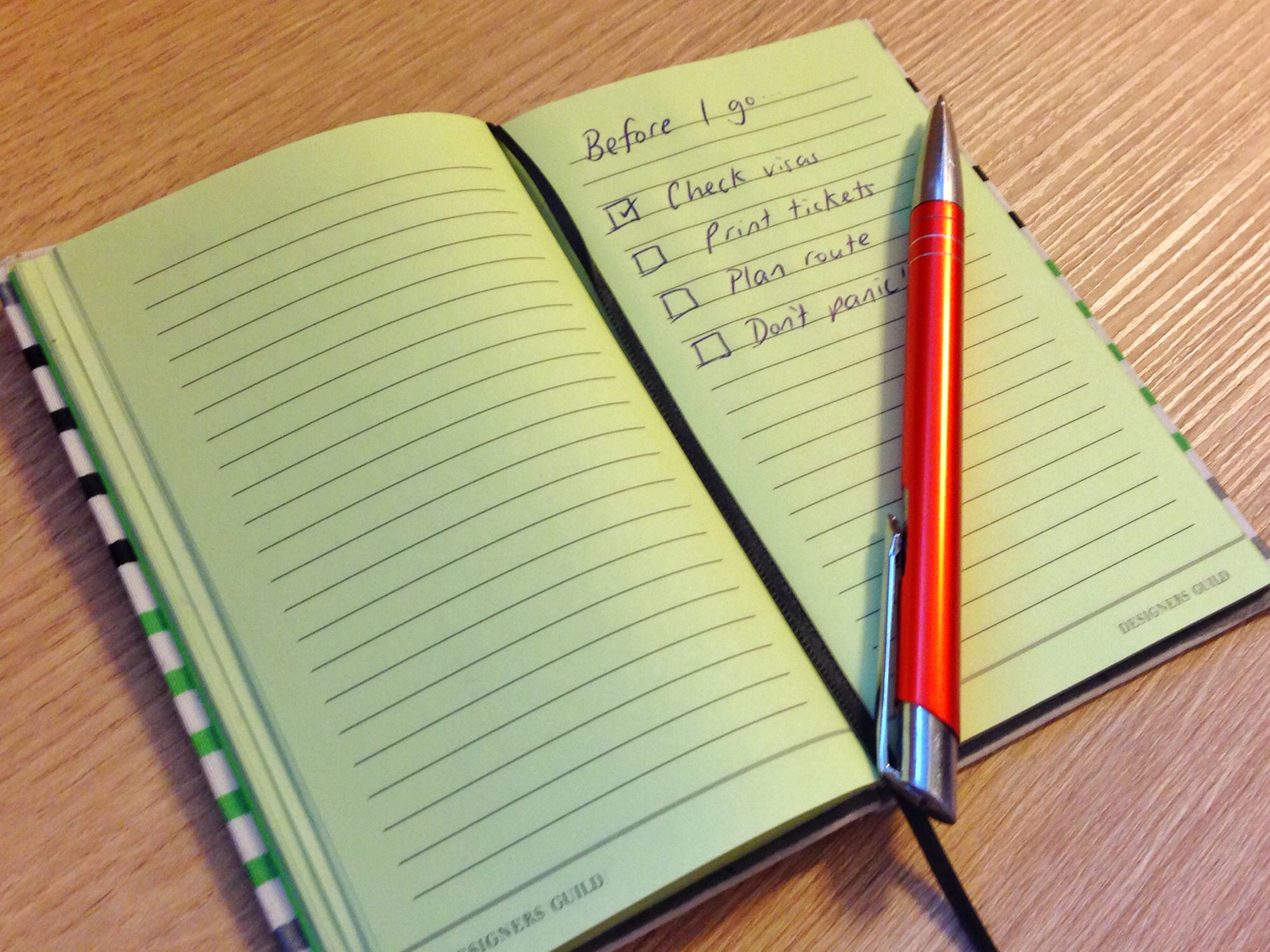
2. Plan the whole journey
Before you leave your accommodation, imagine the whole journey from there to your next destination, which is likely also accommodation of some sort. Plan out the journey — how will you travel from here to the airport/ or bus/train station? On arrival, how will you complete your journey?
If you need to drop off or pick up a rental car, how will you continue your journey from the rental car offices?
If you’re travelling overseas, you may not have internet access in your destination, so I recommend you save the route offline. If you’re travelling with a travel partner, make sure you both have the information, and if there’s any chance you may run out of phone battery, make a note with actual pen and paper!
We use tools like Citymapper and Google Maps to plan our journey, and I find it particularly helpful to take screenshots of the pertinent information so I can find it when necessary.
A particularly important consideration is deciding your departure time. How much time do you want to allow for getting to the airport, and for waiting in line to check in and at security? Different airports will give you a very different experience! You’ll want to allow more time for travelling through London than you would for a small regional airport, for example.
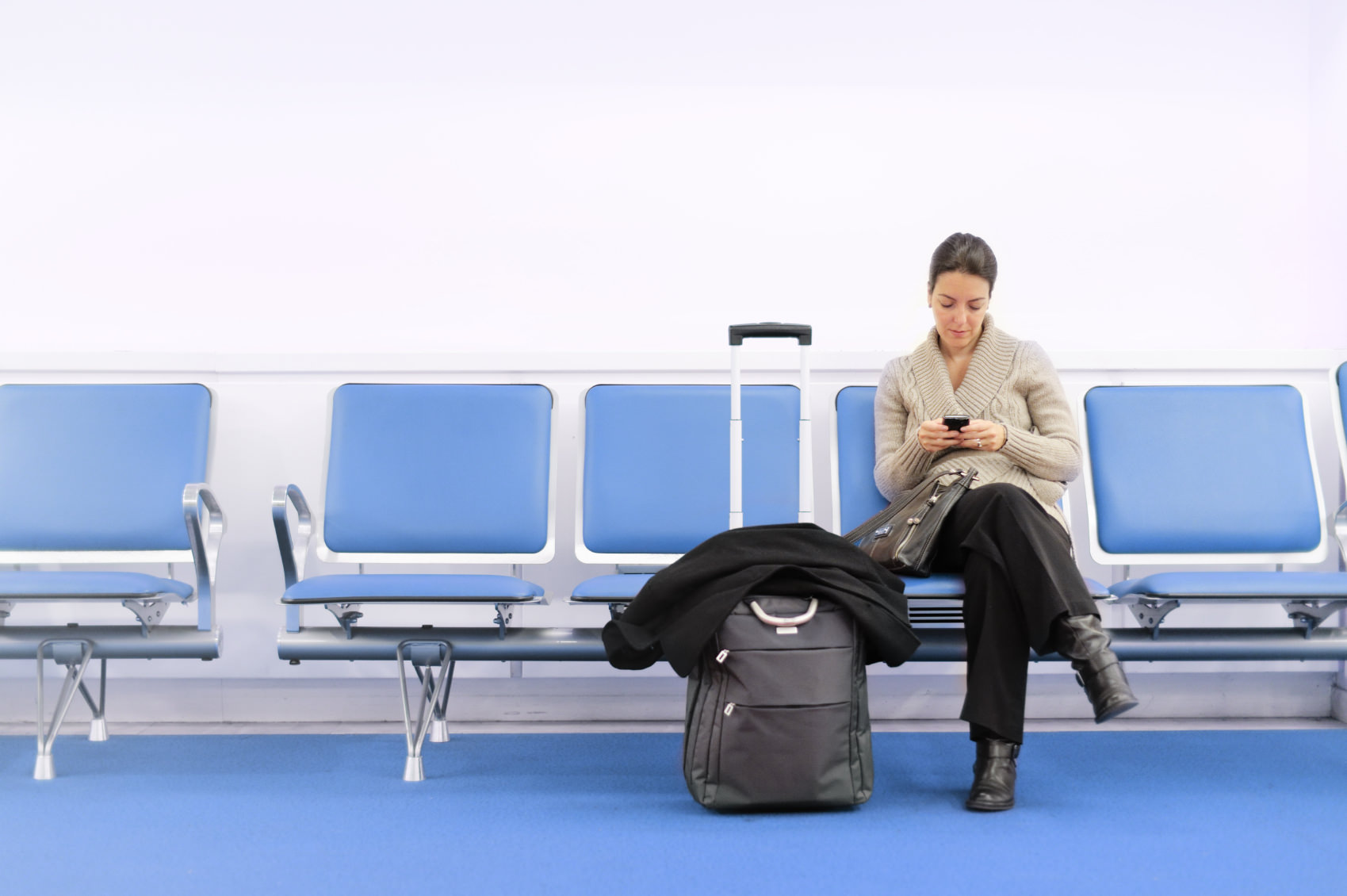
3. Pack for the journey
Of course you’ll have packed for your trip, but it’s also important to consider what you need for the actual journey from place to place, and how you’ll be interacting with your luggage along the way.
Depending on what your transit actually involves, this will vary. For example, I like to have a small bag with me on the plane, but on a recent trip, the journey began with a metro trip on a network famous for its pickpockets. So, I packed everything into one padlocked bag for increased security, and rearranged things when I arrived at the airport.
An example daybag to keep with you on bus, train, or plane may include some snacks, something to drink (or an empty water bottle to refill after airport security), a pen, and a warm layer if necessary. You might want items like tissues, throat lozenges, and lip balm to be easily accessible (can you tell we’ve been a bit unwell recently?.
Another thing to consider is accessibility of items that need to be removed at airport security. Make sure your laptop, other digital devices, and liquids are packed for easy removal at the scanners.
If you’re checking a bag, make sure to put all your liquids and any sharp items in your checked luggage, but not any battery packs — they’ll be removed.
Also think about items you carry on your person, like phone, wallet and passport. If you’re travelling through crowded areas, or on a metro like the one I mentioned earlier, make sure they’re secure, preferably in zip pockets.

4. Have a game plan for easy transit
As well as the journey itself, have a think about practical concerns, and a strategy for when things go wrong.
Documents
For example, where will you keep the important documents like passports and tickets? If you’re travelling as a couple, or with a friend, will you each look after your own, or will one person hold all of them? Talk about this in advance if possible!
Bags
Also decide which bags are going in the hold (or under the bus for coach journeys), and which are you keeping with you, and pack accordingly.
If there’s anything even a little strange in your carry-on bag, be prepared to talk to security staff. I was pulled aside on a journey from Athens to Barcelona because the scanner revealed an odd-shaped metal object at the top of my backpack. As the agent pulled out a bright yellow plastic bag, I realised what it was: “Ah, it’s dolmades,” I exclaimed. Unperturbed, the agent nodded at his colleague, smiled, and replaced them in my bag.
I’d known that this can of dolmades might be an issue (the definition of “liquid” seems remarkably fluid in some airports) and had packed it at the top of my bag to make things easier; I was happy to dispose of it if the security agents had a problem with my love of stuffed vine leaves. As it turned out, it was picked up as a potential issue but wasn’t a problem at all.
As more and more people travel with carry-on bags only, airlines are starting to gate-check bags that won’t fit in the overhead bins. In other words, they take your bag off you at the gate to put in the hold. If this happens to you, it’s helpful if you’ve already thought about what you’d like to keep with you so you can do a quick repack of essential items (laptop, camera, documents, all valuables). We carry a small stuff-down backpack that’s great for this kind of situation. Check out our post about what to pack in your small carry-on bag!
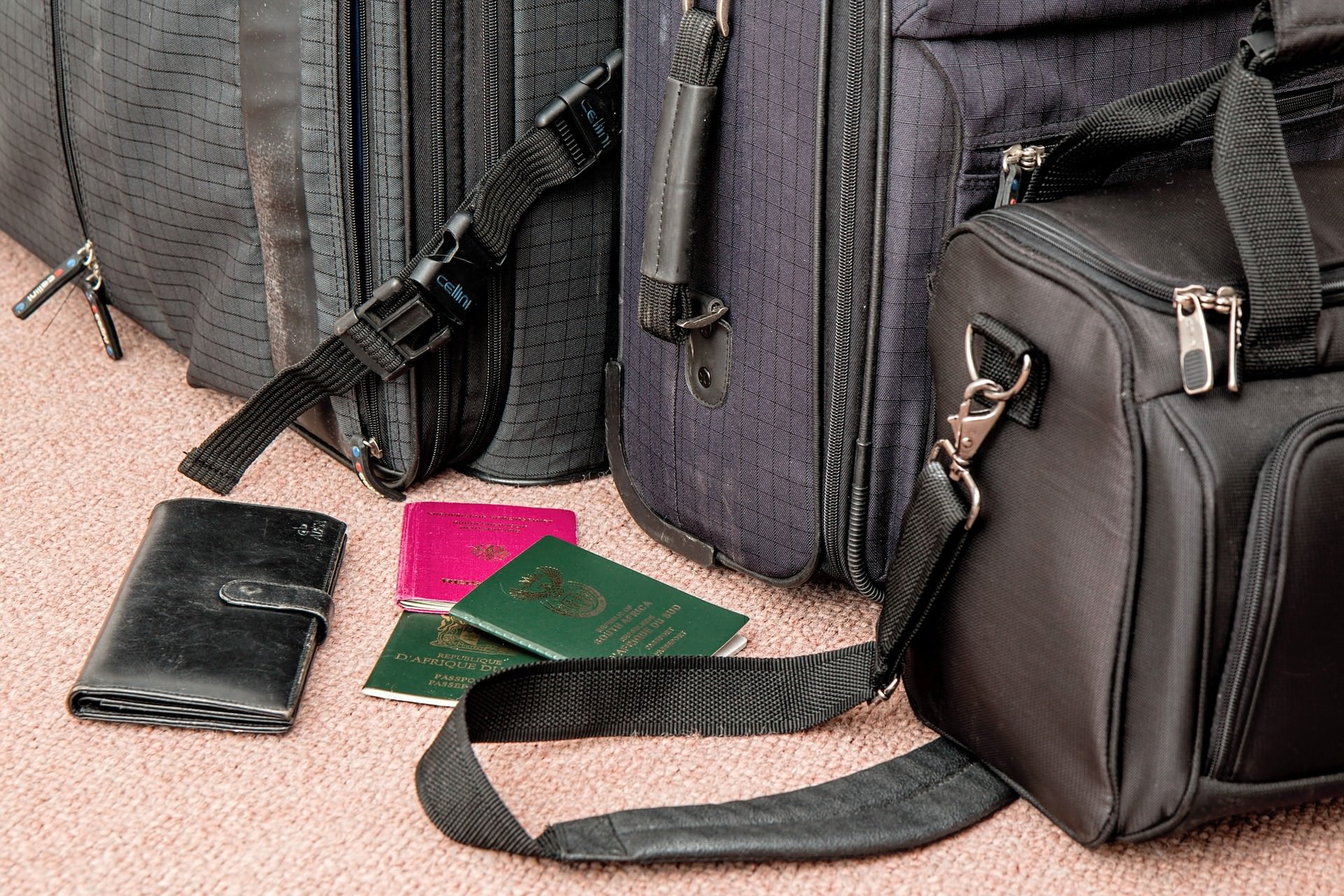
Help each other out
Something Craig and I do if one of us is exhausted is to ask the other to take all responsibility for all or part of the journey. That person makes all the decisions (telling the other as decisions are made) and the tired person isn’t allowed to complain about those decisions — particularly around price, for example.
Car hire
Remember, if you’re picking up a hire car, make sure to triple-check for any damage before you drive away. Take a video of the car if appropriate. If you’ll be driving on the other side of the road than you’re used to, remind yourself of this every time you hop into the car — and if you’re the passenger, don’t be shy about reminding the driver.
5. Be prepared for hiccups
In our experience, transit days rarely go exactly as we imagined! Sometimes things are a lot smoother than we’d have thought, sometimes there are minor delays. And sometimes, the day gets derailed in fun and exciting ways.
Perhaps weather or traffic delays one of your earlier transport connections and you find yourself running late for your flight. Perhaps your flight is cancelled, or overbooked, or the check-in staff have a glitch in their system that prevents people from checking in. Perhaps your accommodation decides for some reason that your booking is invalid and gives your room to someone else. All of these have happened to us (and much, much more) and the world has not ended, despite the stress!
It helps to work extra time into the schedule, to provide a buffer for the inevitable minor issues that will pop up. Most of the time you’ll find yourself waiting at the airport with time on your hands, but often enough you’ll use every minute of the buffer and more.
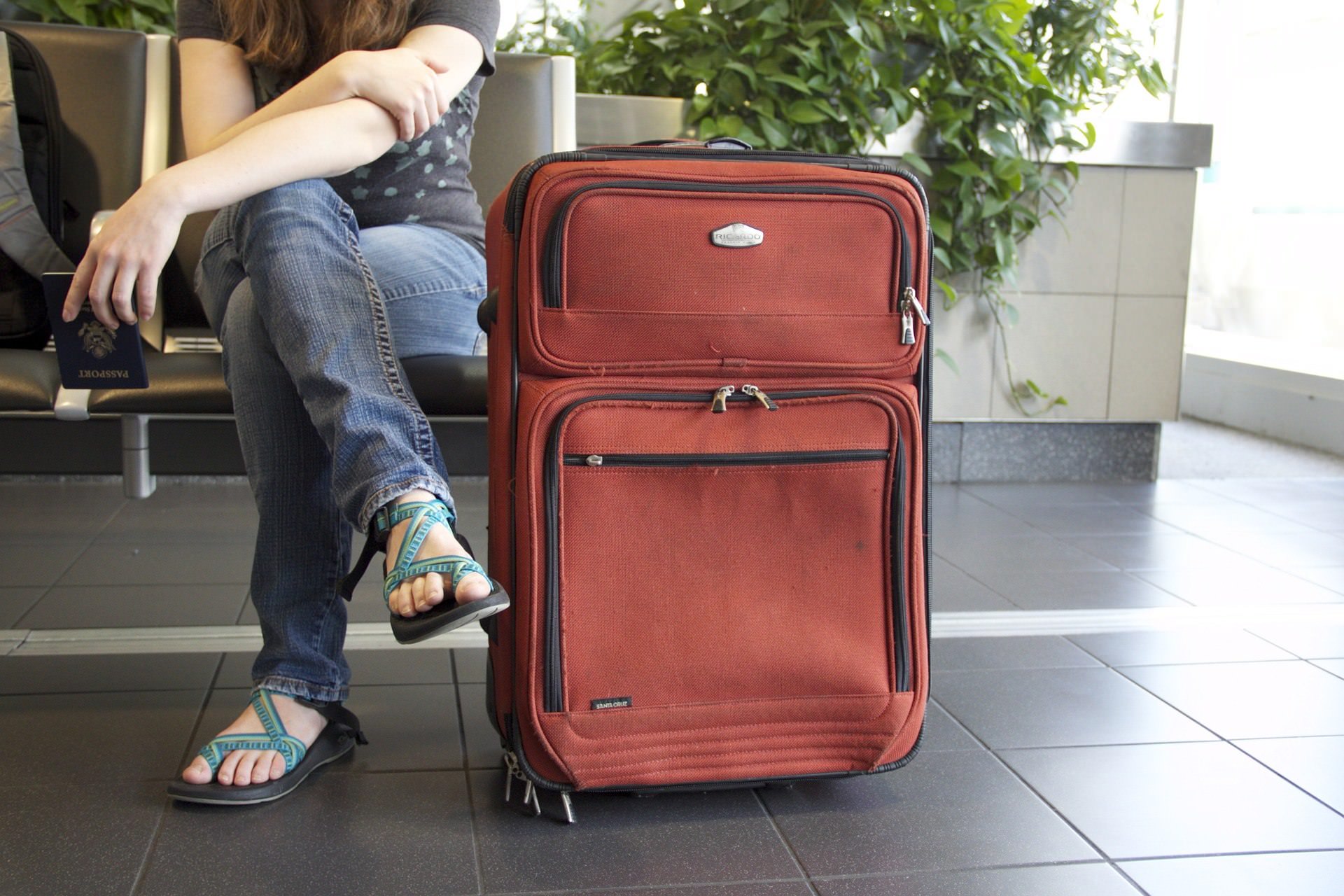
6. If things go wrong…
Firstly, take a deep breath. Things do go wrong. As I mentioned above, there have been plenty of stressful situations that were outside of our control. But there are also situations that could have been avoided — like the time we missed a flight because I’d read the timetable wrong, or the time we had to pay to check in because I didn’t realise online checkin closed four hours before departure.
If you’ve made a mistake, forgive yourself; if it’s your partner’s fault, have grace! Try to deal calmly with the situation in front of you without recriminations. (And just pay the fee.) We recommend you take the path of least resistance on travel days.
If you’re travelling alone and need help, ask for it. If you’re travelling with a partner, just keep talking! You may decide to nominate one of you to make decisions or take control of a conversation (with a check-in clerk, for example).
Try your best to stay calm, especially in difficult situations. For example, if your flight is delayed or cancelled, make sure to check your rights and ask for them to be upheld in a calm, rational tone. Getting angry or upset is unlikely to help.
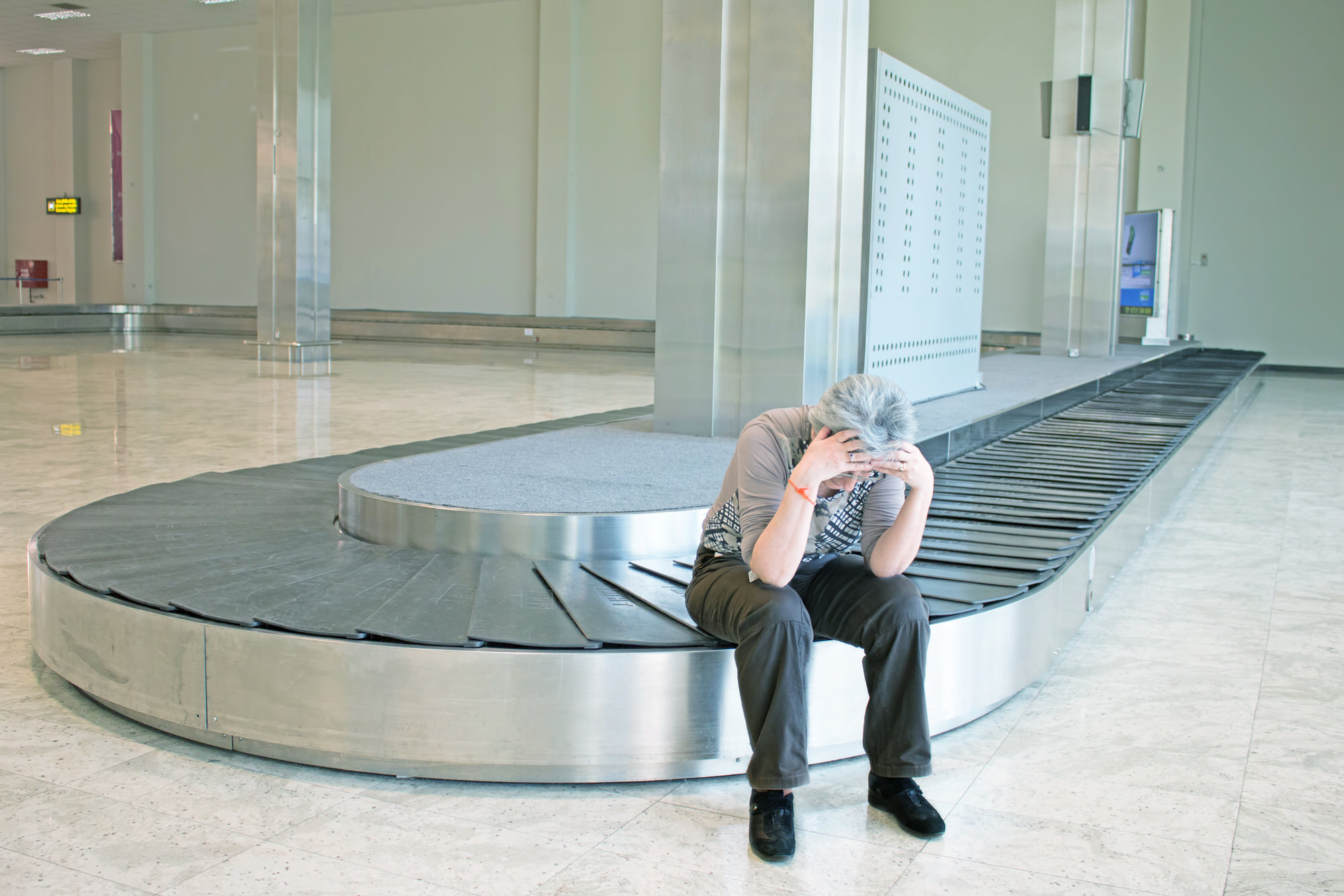
7. On the flight
Once I’m on the plane, I always feel like the hard part of my journey is done, but I know that isn’t the case for everyone!
If you’re a nervous flier, try some deep breathing or meditation techniques. An app like Calm can be a good tool.
Remember to show respect to your fellow passengers and flight crew — after all, there are a lot of people in a small space so it helps to be polite! If you feel uncomfortable because of the people around you — perhaps they are too noisy or behaving inappropriately — approach cabin crew rather than taking matters into your own hands.
We recommend you limit alcohol and avoid taking sleeping pills if possible; some people don’t react well to the combination of planes and pills.
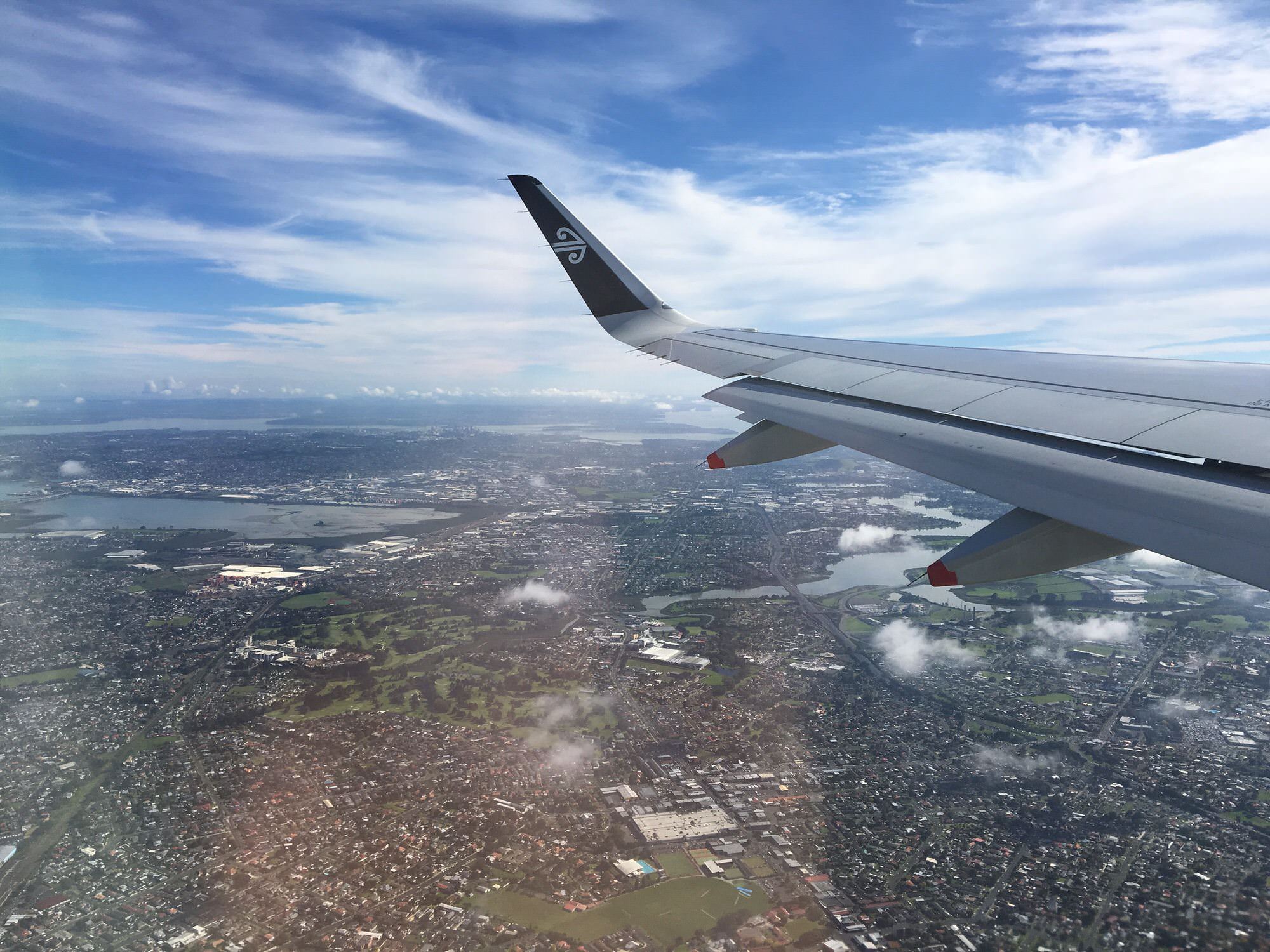
8. Accommodation
You’re likely to end your journey at your next night’s accommodation, which you’ve probably organised in advance! You could be staying with a friend or relative, couchsurfing, renting an AirBnb or other apartment rental, or booked into a hostel, hotel, or guesthouse. Or you could be on your way home.
Most of the time, you’ll arrive, check in or settle in, and have no problems at all. But very occasionally, things fall through — the hotel cancels your booking, the AirBnb host gets the dates wrong and doesn’t show up to let you in, you expected to be able to check in at 11pm but the reception closed at 9pm and there’s nobody around (once again, all real-life examples). None of these are the end of the world, but it’s worth having a backup plan just in case!
If you know you’ll have access to your cellphone data when you arrive, your backup plan could be to do an online search if things fall through. But if you won’t have data, it’s a little more challenging.
One solution for evening/night arrivals is to just note the name and address of a big-brand hotel that’s likely to have 24h reception. Or, if you’ll arrive during the day, the nearest McDonald’s or cafe with wifi so you can do a proper search.

Transit days can be a challenge, but with a bit of preparation and a deep breath or two, you’re sure to get to your destination safe and sane. Have a great trip!
[box] This episode of the Indie Travel Podcast is sponsored by AutoSlash.
AutoSlash is the #1 site for getting a great deal on a car rental. They figure out the best coupons and discount codes to get you the lowest rate possible, and then track prices on your rental right until the day you pick up the car. If they find a lower rate, they email you so you can lock in the savings. It’s like price protection on your rental. They can even track the price of rentals made on other websites.
AutoSlash has saved customers millions of dollars on car rentals. Give it a try on your next booking![/box]
